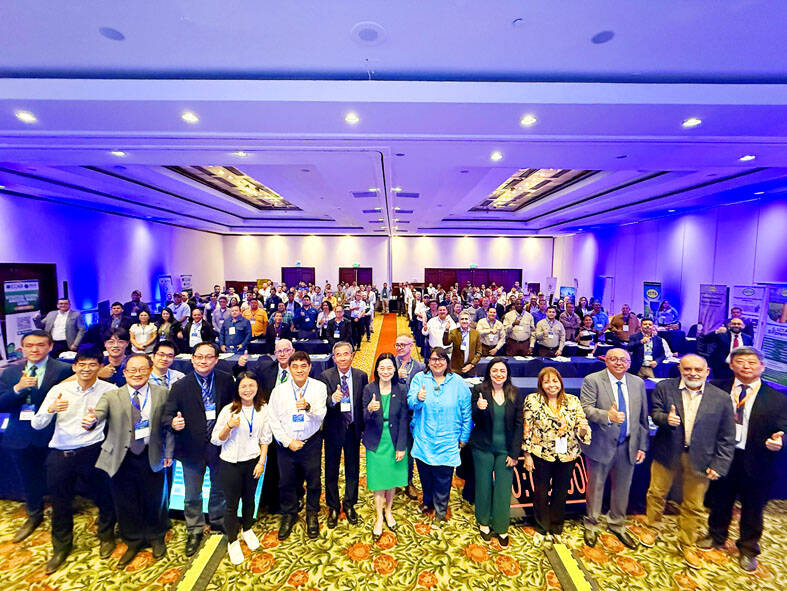The International Cooperation and Development Fund’s technical mission to Guatemala is utilizing drones and biochips to assist diplomatic allies Guatemala and Belize in combating Fusarium wilt, also known as Panama disease.
Latin America and the Caribbean are the leading exporters of bananas across the 35 nations that grow the fruit globally, and Guatemala and Belize both annually export US$1 billion of bananas, the mission said.
Fusarium oxysporum was first detected in the region after an outbreak in Colombia in 2019 and by 2023 it has spread to Peru and Venezuela, the mission said, adding that further spread of the disease to the north would lead to severe losses for all banana producing nations in Central America.

Photo: CNA
The mission said that it had invited top experts in plant disease and pests, as well as biomedical engineers, to visit Guatemala, Belize and Panama, and hold a seminar in Guatemala City on Tuesday to share Taiwan’s successes in plant disease and pest prevention with local governments and agricultural research facilities.
National Chung Hsing University Department of Mechanical Engineering professor Wang Gou-jen (王國禎), who attended the seminar, said Taiwan had used drones carrying Nvidia artificial intelligence (AI) chips for effective monitoring of crop planting areas.
Image recognition technology and AI analysis enable the drones to detect abnormalities in the area, Wang said, adding that the drones would then upload the information to cloud servers or users’ mobile phones.
The technology allows farmers to take immediate action against pests and plant diseases, Wang said.
National Chung Hsing University Graduate Institute of Biomedical Engineering professor Chang Cheng-chung (張健忠) cited Taiwan’s experience during the COVID-19 pandemic, allowing it to develop biochips that can, with the help of big data, detect pests and pesticide residue within 10 minutes.
Previously, samples would have to be sent to a laboratory, where, using expensive equipment and convoluted processes, examinations were performed to detect whether there were pests or pesticide residue, Chang said, adding that the process was not only laborious, but was also only able to detect one kind of pesticide per examination.
With more pesticides using mixed substances, it would take four to five days to run such tests, Wang said.
Mission representatives said government officials at the seminar had been greatly interested in a rapid screening kit for Fusarium wilt developed by National Taiwan University professor Hung Ting-hsuan (洪挺軒), and models developed by the National Pingtung University of Science and Technology Work Dog Training Center that train dogs to detect the smell of brown root rot.

Taipei, New Taipei City, Keelung and Taoyuan would issue a decision at 8pm on whether to cancel work and school tomorrow due to forecasted heavy rain, Keelung Mayor Hsieh Kuo-liang (謝國樑) said today. Hsieh told reporters that absent some pressing reason, the four northern cities would announce the decision jointly at 8pm. Keelung is expected to receive between 300mm and 490mm of rain in the period from 2pm today through 2pm tomorrow, Central Weather Administration data showed. Keelung City Government regulations stipulate that school and work can be canceled if rain totals in mountainous or low-elevation areas are forecast to exceed 350mm in

TRAFFIC SAFETY RULES: A positive result in a drug test would result in a two-year license suspension for the driver and vehicle, and a fine of up to NT$180,000 The Ministry of Transportation and Communications is to authorize police to conduct roadside saliva tests by the end of the year to deter people from driving while under the influence of narcotics, it said yesterday. The ministry last month unveiled a draft of amended regulations governing traffic safety rules and penalties, which included provisions empowering police to conduct mandatory saliva tests on drivers. While currently rules authorize police to use oral fluid testing kits for signs of drug use, they do not establish penalties for noncompliance or operating procedures for officers to follow, the ministry said. The proposed changes to the regulations require

EVA Airways president Sun Chia-ming (孫嘉明) and other senior executives yesterday bowed in apology over the death of a flight attendant, saying the company has begun improving its health-reporting, review and work coordination mechanisms. “We promise to handle this matter with the utmost responsibility to ensure safer and healthier working conditions for all EVA Air employees,” Sun said. The flight attendant, a woman surnamed Sun (孫), died on Friday last week of undisclosed causes shortly after returning from a work assignment in Milan, Italy, the airline said. Chinese-language media reported that the woman fell ill working on a Taipei-to-Milan flight on Sept. 22

1.4nm WAFERS: While TSMC is gearing up to expand its overseas production, it would also continue to invest in Taiwan, company chairman and CEO C.C. Wei said Taiwan Semiconductor Manufacturing Co (TSMC) has applied for permission to construct a new plant in the Central Taiwan Science Park (中部科學園區), which it would use for the production of new high-speed wafers, the National Science and Technology Council said yesterday. The council, which supervises three major science parks in Taiwan, confirmed that the Central Taiwan Science Park Bureau had received an application on Friday from TSMC, the world’s largest contract chipmaker, to commence work on the new A14 fab. A14 technology, a 1.4 nanometer (nm) process, is designed to drive artificial intelligence transformation by enabling faster computing and greater power